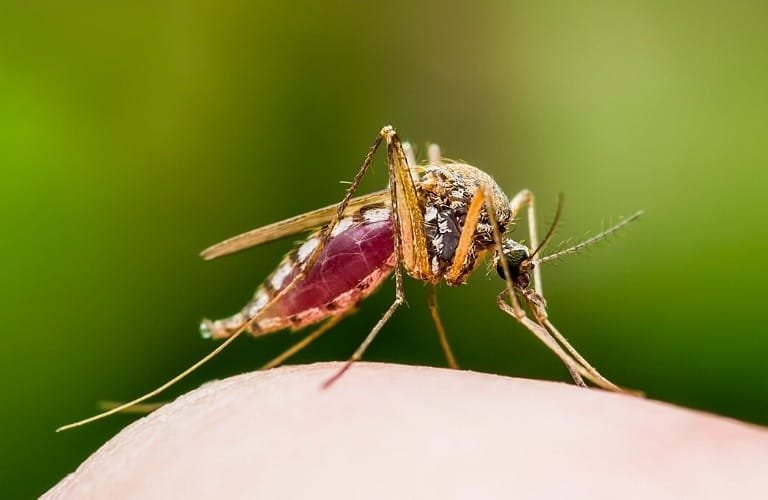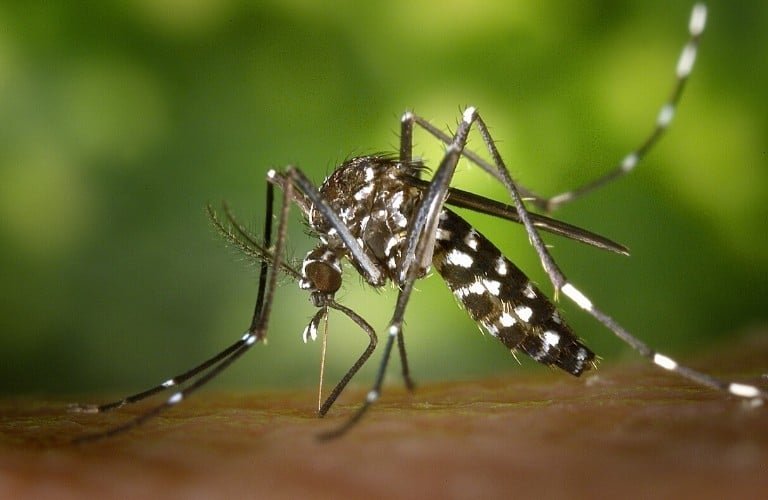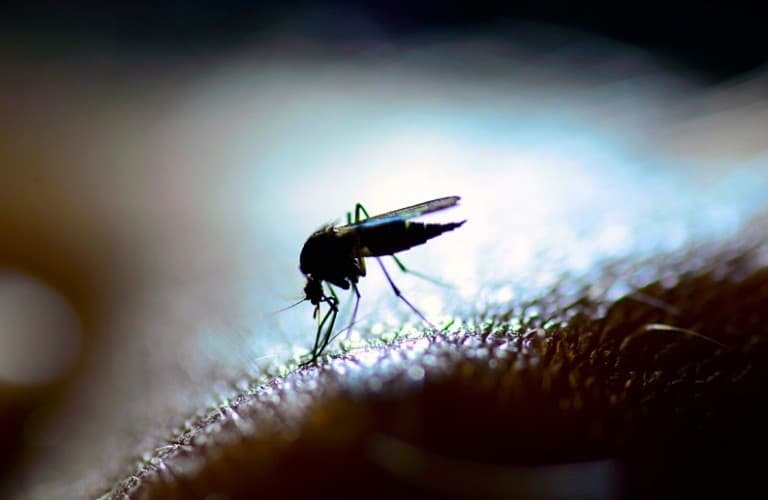Mosquitoes are insects that ruin lovely summer evenings for many people.
They buzz around and leave itchy little bumps all over your legs and arms while you’re trying to enjoy time outdoors.
If they get inside your home, you’ll be pestered no matter what you’re doing, especially at night.
How do you get rid of mosquitoes? Applying Bti to mosquito breeding areas and removing sources of standing water will decrease the population. Indoors, use fans, camphor, and essential oil sprays. Outdoors, use bug zappers, candles or incense, DEET repellents, pesticide sprays, and insect growth regulators.
When mosquitoes are driving you crazy, you want immediate relief.
In the following, you’ll learn about the best products to use for fast help and steps to take to reduce future problems so you’ll be able to enjoy being outdoors again.
Be sure to read through all of our mosquito articles so that you’ll be as well prepared as possible to win the battle against these annoying pests.
Identifying Mosquitoes
Mosquitoes look bigger than they actually are thanks to their long legs. The actual body is slim and only 3-6 millimeters long.
They have short antennae and a long, tube-like mouthpart that they use to suck blood.
They’re usually dark gray and black, though some species will have white, or even green or blue, markings.
They’ll find you long before you notice them, but you can usually see them around standing bodies of water.
(In this article, you’ll learn where they are most likely to hide, both outside and indoors.)
Females lay their eggs near the water or in the water on aquatic plants. Eggs and larvae require water to develop, and they need to be fully submerged.
If you have standing water in your yard or even a water fountain, you’re probably going to end up having an abundance of mosquitoes.
Some types of mosquitoes are active during the day, while others are out searching for a meal at night (learn more here).
So if it seems as if you never catch a break from these little nuisances, you’re right!
Removal Methods
| Method | Estimated Cost | Natural | Odor Free |
| Bti (Bacillus thuringiensis israelensis) | $15 | ✅ | ✅ |
| Oscillating fan | $25 | ✅ | ✅ |
| Camphor | $10 | ✅ | |
| Essential oils | $10-12 | ✅ | |
| Bug zapper | $40 | ✅ | ✅ |
| Candles/Incense | $11 | ✅ | |
| Insect repellent with DEET | $20 | ✅ | |
| Aerosol pesticide spray | $13 | ||
| Larvicide | $40 | ✅ |
The Best Way to Eliminate Mosquitoes
The best way to get rid of mosquitoes is to treat them at the source, which is why we recommend Bacillus thuringiensis israelensis, or Bti.
Bti is a naturally occurring bacteria that kills mosquito larvae by poisoning their stomachs, causing them to be unable to eat.
They eventually starve to death, so they never reach adulthood.
Summit Responsible Solutions Mosquito Bits is an excellent option because it doesn’t add any kind of pesticide.
No products found.
No products found.
To use it:
- Locate the site where mosquitoes lay eggs.
- Sprinkle the Bti bits in the water on the site. You can pour it into water or on soil.
- Check in two weeks to see if it eradicated the infestation. Apply it again if necessary.
- Reapply every two weeks for continual control and prevention.
Basic Guidelines
Mosquito populations can quickly get out of hand if they’re not tended to immediately. Fortunately, preventing them is pretty easy to do.
Remove Breeding Grounds
Mosquitoes will settle down wherever they can find a suitable location to lay their eggs.
Their eggs and larvae require plenty of water, so the following areas are prone to serve as breeding grounds for mosquitoes:
- Kiddie pools.
- Leaf piles.
- Gutters.
- Birdbaths.
- Puddles.
- Containers of water.
- Low spots.
- Water features.
All of the above should never be left in your yard for too long. Even outdoor furniture can become breeding grounds if water puddles on the cushions after it rains.
Rake leaves frequently, fill in low spots in your yard so they don’t collect water, and cover up anything that might hold water when it rains.
Did you know that not all mosquito species lay eggs in water? Learn about other potential breeding grounds here.
Maintain Water Features
Water features like ponds and fountains should be maintained frequently to prevent mosquitoes from laying eggs.
You should clean these features weekly, although this may vary depending on care needs.
If you have a a water feature that keeps water running, you won’t have to worry about those as much, so long as all the water keeps moving.
However, the edge of the water feature where the water is calmer might serve as a breeding ground.
Large koi ponds that have a fountain and fish may not have mosquitoes as often since fish eat mosquitoes and their eggs and the water doesn’t have much of a chance of going stagnant.
However, aquatic plants are highly attractive places for mosquitoes to lay eggs.
Consider adding turtles or frogs to the pond since they eat mosquitoes, or hang a bird feeder, like this squirrel-proof feeder with a rain guard, nearby to attract insect eating birds.
No products found.
No products found.
Water features that don’t have running water, such as birdbaths, will need to be cleaned more often, especially in the summer.
If birds or other animals don’t stir the water around too often, you should check it every few days for signs of mosquitoes.
Grow Plants That Repel
If you have a mosquito problem, consider growing plants that will deter them. Mosquitoes are picky about smells and certain plants will cause them to avoid the area.
Some of those plants include:
- Basil.
- Dill.
- Lantana.
- Lavender.
- Lemongrass.
- Marigolds.
- Peppermint.
- Rosemary.
Most of these herbs and flowers can be planted almost anywhere, so you can put them in flowerbeds, vegetable gardens, and even around water features if there’s room to include soil.
Consider growing these in containers and placing them around your patio if you want to spend an evening outside uninterrupted.
Some mosquitoes are persistent despite your careful efforts to exclude them. So, let’s take a look at what you can do to get rid of them once they’ve settled in.
Natural Solutions to Get Rid of Mosquitoes
Most people turn to pesticides first when it comes time to battle mosquitoes, but there are actually many natural remedies you can use to kill off and repel mosquitoes in a safer manner.
No products found.
Indoor Infestations
Pesticides aren’t safe to keep inside the home, especially if you have children or pets.
Try these natural solutions the next time you see a mosquito trying to land on you when you’re inside.
Oscillating Fan
Repelling mosquitoes can be as simple as turning on a fan. Mosquitoes are lightweight and are weak fliers, so they can’t handle much more than a small breeze.
If you have mosquitoes bugging you while you’re trying to lie on your bed or couch, try turning a fan on and point the air so that it blows beside you instead of on you.
You can also point fans toward the front and back doors of your home if you’re going to be going in and out repeatedly.
This portable oscillating fan is perfect for battling mosquitoes because it’s small and can be moved around wherever you need it.
So, if you need it by your bed at night and on the couch during the day, you can easily pick it up and move it around with you.
This fan has three speeds, can move side to side, and can be adjusted up and down.
Camphor
Camphor is the wax of the camphor tree and has several uses. One of them is as mosquito repellent since they hate the smell.
Camphor comes in many forms including oil, sticks, tablets, and powder.
Soul Sticks Camphor Tablets are perfect because you can burn or melt them to release the scent and mosquitoes will evacuate the room as soon as possible.
A heatless method is to leave the tablets in a bowl of water and let it sit. The water method doesn’t work as quickly, but it’s a safe option if you need to leave it unattended.
To quickly get rid of mosquitoes with camphor, you need to burn camphor for one hour with all the doors and windows closed.
This method isn’t recommended if you need to leave the room. You can also try this method with a wax burner so it will melt and release the scent without needing a flame.
Essential Oils
Essential oils are another remedy that works well because of the mosquito’s picky preferences.
They hate the smell of lavender and tea tree oil, both of which are usually loved by humans. If you enjoy these smells, this will be an easy remedy that you’ll love to use.
We recommend Cliganic Organic Lavender Essential Oil and Maple Holistics Tea Tree Essential Oil.
Both oils are undiluted and pure, meaning that nothing was added to them. Cliganic’s lavender is certified organic, so it doesn’t contain any oils from genetically modified lavender.
Essential oils can irritate the skin if they aren’t diluted, and some of them may stain surfaces in your home.
Add 10-15 drops of oil into an 8-ounce spray bottle of water to dilute it. It’ll be safe enough to spray in your home and on yourself.
This mixture will repel mosquitoes, so you can even use it on your clothing (yes, mosquitoes can bite through clothes) and skin when you go outside.
Outdoor Infestations
It’s crucial to use natural solutions to mosquitoes when you’re outside since you’re around plants and animals.
Pesticides can hurt all living things, but these natural remedies are harmless and won’t disrupt the ecosystem in your yard.
Bti (Bacillus thuringiensis israelensis)
Although it sounds like a chemical, Bti is mostly harmless to the environment. Bti is bacteria, so it’s natural.
However, it’s still treated with the same caution given to pesticides because some studies have shown eye and skin irritation to occur when animals and humans came into direct contact with it.
Some states may not allow homeowners to use Bti in areas where water will run off into a bigger body of water but will allow it in standing water that doesn’t flow off the property.
Summit Responsible Solutions Mosquito Bits are dried corn cobs covered in Bti. The corn cobs can be poured into standing water or on the soil.
Bti is only effective against larvae, so it won’t kill mosquitoes that are in the pupal or adult stages.
However, it’ll prevent the larvae from reaching adulthood, so your mosquito problem will die out at the source, which is the best way to eradicate them.
Bug Zapper
Bug zappers are a simple way to get rid of mosquitoes while you sit on your porch.
They attract mosquitoes and then kill them by electrocution when they touch the light.
The Klahaite Electric Bug Zapper will work in many different areas. It’s able to hang from a hook or sit on a table, so you can easily move it wherever you need it.
It can attract mosquitoes that are up to 1,500 feet away, so it’s great to use in large backyards.
It has a plastic cage around the light to prevent little fingers and nosy animals from getting accidentally hurt.
Candles
Candles and incense sticks work well as mosquito repellent.
Mosquitoes hate smoke that comes from candles, so if you choose scents they hate, they’ll act as a 2-in-1 repellent.
We carefully reviewed popular mosquito candles for effectiveness and share what we found to be the best in this article.
Mosquito Guard Repellent Incense Sticks are a great option because they’re made with three scents mosquitoes hate: citronella, rosemary, and lemongrass.
Since they also produce smoke, those are four things that will make them want to fly away.
The best way to use these incense sticks is to light them and allow them to burn for 10 minutes before you want to sit in the area.
This will allow time for the smell to spread and most mosquitoes to vacate the area. You can use an incense holder or stick the end in soil in a potted plant.
These should not be left unattended while burning, so check them every few minutes if you need to leave the area.
Pesticide Solutions to Get Rid of Mosquitoes
Sometimes natural remedies don’t seem to be strong enough. When you feel like you’re out of options, there are some pesticides you can use that are super efficient.
No products found.
Insect Repellent with DEET
DEET is a chemical that was invented in the 1940s to be used for military purposes, but over the years it’s become a household item for many families.
Most repellents rely on DEET because this chemical has proven to be the most effective against mosquitoes time and time again.
There’s little evidence that it causes cancer and other health issues.
While many people may question its safety, the Centers for Disease Control and Prevention and the Department of Health and Human Services say it’s not classified as a carcinogen.
However, if you have any reservations about using this chemical on yourself, there’s no harm in being cautious.
Ben’s 100 Insect Repellent contains the maximum amount of DEET that’s allowed in a product, so it’s sure to keep mosquitoes away from you.
The spray will last up to 10 hours before you need to reapply it, so that’s essentially an entire day outside.
It also doesn’t have any fragrance in it, so it won’t be overwhelming or annoying to use.
Aerosol Spray
Aerosol spray pesticides kill mosquitoes on contact.
Cutter Backyard Bug Control Outdoor Fogger can be sprayed all over your yard so you can kill the mosquitoes that are hiding in bushes, grass, and puddles.
This product will also kill ants, gnats, flies, and several other pests.
It’s not meant to be used on skin and shouldn’t be applied more than once in a single day. This spray does contain harmful chemicals that may burn your eyes, nose, and skin, so be sure to wear protective clothing when you use this product.
Larvicide
Altosid Pro-G Mosquito Larvicide is essentially a chemical version of Bti since it targets mosquitoes in the larval stage.
You can apply it to standing water sources, leaf piles, soil, and other places you expect mosquitoes to lay their eggs.
The population will be noticeably smaller in a few weeks after application since larvae aren’t maturing into adults.
Since this product contains chemicals, make sure your state doesn’t have any regulations against using this product in areas where the product can run off into main bodies of water.
Safety Precautions When Using Pesticides
Pesticides utilize dangerous chemicals to kill mosquitoes. These chemicals are also dangerous to people, pets, and plants.
When you use these products, read the label carefully, and follow the directions so you don’t accidentally misuse the product.
You should always protect your face and skin when you use pesticides.
When to Call a Professional Exterminator
Exterminators will be able to help you with any size infestation. If you’re not sure how to get rid of them or nothing you’ve tried has worked, contact a local professional to get help.
They’ll be able to locate the source of the mosquitoes, eliminate the problem, and help you prevent future infestations.
Sources:
https://www.doh.wa.gov/CommunityandEnvironment/Pests/Mosquitoes/Bti
https://en.wikipedia.org/wiki/Cinnamomum_camphora
https://www.consumerreports.org/insect-repellent/how-safe-is-deet-insect-repellent-safety/




